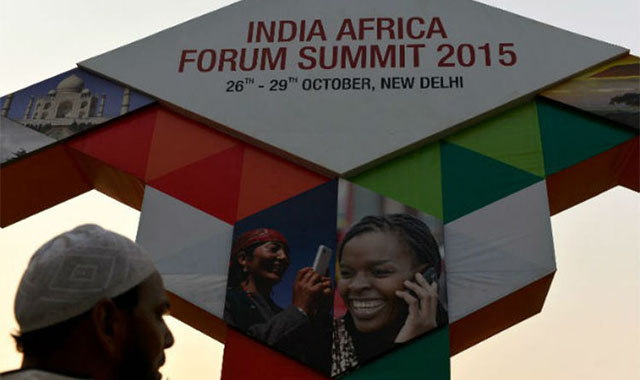Africa needs more action, not talk-shops


Events such as India-Africa Forum while they offer feel good conversation about Africa’s marginalisation, the need for partnership between Africa and the new emerging powers, and pledges of development funding, in reality are profitable for the hosts rather than for African countries
William Gumede Correspondent
Real partnership between Western powers and Africa should involve abolishing trade agreements that benefit Western countries and punish African countries. It involves allowing African countries the freedom to come up with their own policies, just like Western countries, without facing market or trade backlashes.
Large African country delegations regularly troop to workshops such as the World Economic Forum (WEF) taking place annually in Davos, Switzerland, hawking their countries’ attractions, “networking”, and warming the seats on debating panels with Western and emerging powers’ executives and government leaders.
Beyond being paraded as case studies, socialising with and being talked down to by Western money, multilateral organisations and political elites, very little concrete development for Africa comes, or can come, from this.
Similarly, meetings organised by leading industrial countries such as the US or EU, where they bring African leaders as a collective to their capitals to discuss political, trade and cultural partnerships, often bear very little fruit for Africa itself.
Firstly, it reinforces the colonial relationship with African leaders as a collective, having to troop to former colonial overseers, essentially to be patronised.
Lots of promises of trade, development and cultural partnerships are often made at such events, with very few real benefits for Africa, except window dressing.
As a case in point, in none of the EU-Africa gatherings in Europe have the European Partnership Agreements (EPAs), the new trade agreements that replaced the Lomé Convention, but which are devastatingly one-sided against Africa, in favour of the EU, been changed to one more beneficial to Africa.
The US-Africa summits, where African leaders collectively go to Washington, provide very little practical developmental help to Africa.
The US-Africa relationship, whereby African raw materials, which create very few jobs or wealth on the continent, can easily be exported to the US, while manufactured African goods, which can create jobs and wealth, face trade barriers, has not been improved at any of these US-Africa summits.
In spite of all the regular gatherings between France and its former African colonies, the colonial pact between France and francophone African countries, which among other things, empowers France to hold the bulk of the foreign currency reserves of former African colonies in France, and essentially control their monetary policy, has not been abolished.
Emerging powers such as China and India have recently organised events such as the China-Africa Forum, or the India-Africa Forum, where African leaders as a group are invited to meet with Chinese and Indian leaders to promote African “development”.
Again such meetings, while they offer feel good conversation about Africa’s marginalisation, the need for partnership between Africa and the new emerging powers, and pledges of development funding, in reality are profitable for the hosts rather than for African countries.
Firstly, such gatherings showcase the new power of countries such as China and India, that they can, just like the US and the EU, bring many African country leaders to their capitals in one go to talk shop.
At the China-Africa or India-Africa summits, there are often public announcements of large sums to be invested in Africa.
The small print is that this is rarely money that will be directly transferred into individual African country fiscuses.
Such money is support for Chinese or Indian companies to invest in Africa on their terms, into the projects important and beneficial to them, and not necessarily to Africa. And many times the money promised is simply a promise being repeated, not new money.
It should be African countries deciding where development should take place, what development should be and how the development should take place, and then partnering foreign investment to these home-grown targeted development initiatives.
New emerging powers, just like the West, want Africa’s raw materials — and that does not create much wealth or jobs for Africa, and makes it easier for such African raw materials to enter their countries.
In spite of all the regular jamborees between Africa, Western and emerging powers, if any African country has the ability to export finished products to either Western or emerging powers, they will still find all sorts of obstacles in getting their products into markets there.
To demonstrate solidarity with Africa, new emerging powers must allow African manufactured products into their markets, and partner with Africa in joint manufacturing projects to provide direct finance for development or infrastructure, not through intermediaries and not with punishing strings attached.
Real partnership between Western powers and Africa should involve abolishing trade agreements that benefit Western countries and punish African countries.
It involves allowing African countries the freedom to come up with their own policies, just like Western countries, without facing market or trade backlashes.
Western companies siphon off money from Africa through dubious tax schemes or other means.
If combating this was the objective of international investment forums such as the WEF, then perhaps, there would be some benefits for Africans.
Sadly, African continental and regional leadership gatherings are also little more than talk-shops.
Almost every meeting talks about improving trade between African countries, of unfair trade terms between Africa and Western and emerging powers, of African solutions to African problems. Very little comes from this.
African countries need closer regional and continental trade cooperation with each other. At the heart of an African regional integration project must be a continental industrialisation plan: such a plan would identify viable future industries which different African countries specialise in.
Every African country should have its own country-level industrial plan, which should be integrated into regional and continental ones.
At the core of every individual African country’s industrial policy must be a determination to diversify their economies away from exporting raw materials, and produce finished products and grow the food they need.
Smart regional integration will focus on clustering African countries around what they can specialise in, and their trading or even bartering with each other, one country providing what the other country needs but is not capable of producing or growing.
Some of Africa’s manufactures and services may be uncompetitive in relation to those of industrial countries or new emerging markets, but they may be useful to trading with neighbours.
A prerequisite to genuine prosperity, Africa needs fewer talkshops at home or abroad and more practical action. — New African.









Comments